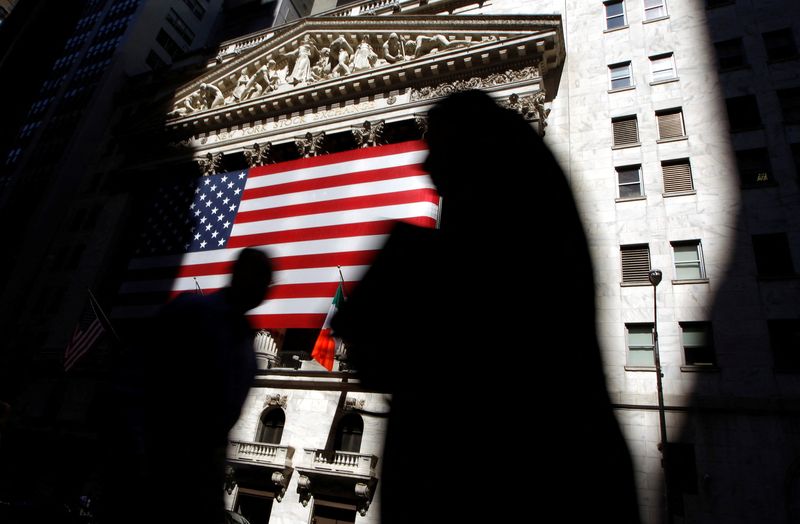Street Calls of the Week
Investing.com - A deluge of U.S. corporate earnings is expected to be in focus for markets this week, although sentiment could still be swayed by ongoing trade negotiations between Washington and its global trade partners. The European Central Bank is anticipated to leave interest rates unchanged at its July 23-24 meeting, while media reports say President Donald Trump could reveal new artificial intelligence-focused executive orders in the coming days.
1. Earnings this week
The pace of the quarterly earnings season picks up in the coming days, with over 85% of S&P 500 companies yet to post returns.
On Monday, telecommunications group Verizon (NYSE:VZ) will headline the slate of results before the opening bell, while chipmaker NXP Semiconductors (NASDAQ:NXPI) is expected to highlight a string of reports after the close.
Texas Instruments (NASDAQ:TXN) and Coca-Cola (NYSE:KO) are scheduled to report on Tuesday, followed by tech giants like Google-owner Alphabet (NASDAQ:GOOGL) and electric car manufacturer Tesla (NASDAQ:TSLA) on Wednesday. Intel (NASDAQ:INTC), Union Pacific (NYSE:UNP) and Honeywell International (NASDAQ:HON) are also due to open their books on Thursday, and Phillips 66 (NYSE:PSX) and AutoNation (NYSE:AN) will be among the names rounding out the week on Friday.
Roughly 12% of the S&P 500 has reported during the relatively young earnings season. Of those, 86% have beat their per-share earnings expectations and 67% have delivered higher-than-anticipated sales.
Some investors have flagged that the relative early strength of the reporting period could lead to increasingly heightened expectations. However, the start has been broadly positive, even as businesses deal with an uncertain economic landscape marked by concerns over the impact of global trade tensions.
2. Trade negotiations
The White House is reportedly holding a series of negotiations with key U.S. trading partners as an impending August 1 deadline for President Trump’s elevated "reciprocal" tariffs to take effect edges closer.
With the trajectory of the tariffs likely to be a central determining factor in the outlook for the wider operating environment over the rest of 2025, any developments will likely be scrutinized by investors.
One crucial unknown revolves around the fate of U.S. talks with the European Union, despite Commerce Secretary Howard Lutnick noting confidence in the prospect of a trade pact over the weekend.
The European bloc has been pushing for Washington to agree to maintain a baseline 10% duty, but U.S. officials told the EU’s trade chief last week that they expect Trump to demand more concessions, the Wall Street Journal reported. These would include a baseline tariff of 15% or higher, the paper added.
In response, Germany -- Europe’s biggest exporter and economic powerhouse -- has joined France in backing a more confrontational stance with the Trump administration, the WSJ said. The EU is even mulling fresh measures to hit back against U.S. companies that go beyond already outlined retaliatory levies on goods should a deal not be reached, according to the report.
3. ECB decision
The European Central Bank is expected to unveil its next policy decision on July 24, with investors widely anticipating that it will leave key interest rates unchanged.
Analysts widely expect the ECB to keep its key deposit rate steady at 2%.
At its last meeting in June, policymakers, bolstered by signs of flagging inflation and tepid economic activity in the 20-member euro zone, slashed rates by 25 basis points. It was the eighth reduction in a year, although it came with an indication from the ECB that it would likely pause in July, largely due to uncertainty around trade tensions with the Washington.
"[T]he ECB’s next steps will be heavily influenced by developments in the tariff dispute and its impact on growth expectations," analysts at Erste Group said in a note.
4. Trump to unveil AI-focused executive orders - WSJ
The White House is preparing a new executive order which would mandate that artificial intelligence companies receiving federal contracts must institute politically neutral and unbiased viewpoints in their AI models, the WSJ reported.
Figures close to Trump, including AI Czar David Sacks and AI policy advisor Sriram Krishnan, designed the order, which would come as many conservatives have argued that AI models have become too politically liberal, the WSJ said.
Such an order could have sweeping consequences for the tech industry, especially as giants of the industry are attempting to secure government contracts that include their AI products, it added.
Trump is expected to speak about his AI "action plan" at an event this week, where he will release several other executive orders aimed at keeping the U.S. ahead of China in the ongoing AI arms race, the paper said.
5. Flash PMIs
On a relatively light economic calendar, markets will be keeping tabs on the publication of flash purchasing managers’ index figures on Thursday.
Economists anticipate that the preliminary July manufacturing PMI reading from S&P Global will come in at 52.7, down slightly from 52.9 in the previous month. A gauge of services activity, meanwhile, is tipped to edge up slightly to 53.0 from 52.9.
Numbers above the 50-point mark indicate expansion.
Despite uncertainty around the trajectory of Trump’s aggressive tariff agenda, the U.S. economy has shown broad signs of resilience. The stock market has touched record highs, retail sales have topped forecasts, consumer sentiment has improved and a sharp spike in inflation -- much feared after Trump revealed his "reciprocal" tariffs in April -- has not come to pass. Still, analysts have flagged that the impact of the tariffs could still materialize in the months ahead.
